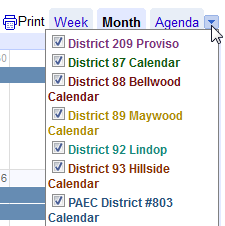PAEC ELL Blog
A dynamic and interactive resource for professionals to post questions about English Language Learners to the PAEC Bilingual Psychologists and read questions and discussions about English Language Learners by others in the co-op.
Bilingual Education Definition, Goals, Rationale, Programs and Empirical Findings
An appendices from Special Education Assessment Process for Culturally and Linguistically Diverse Students, Guidelines and Resources for the Oregon Department of Education-2007 Revisions. Includes descriptions of bilingual education programs and ESL programs, and shows general guidelines for expected patterns of test performance for diverse individuals.
Center for Applied Linguistics
CAL provides many resources regarding English Language Learners, Foreign Language, Testing / Assessment, Literacy Education, Dialects, Refugee Integration, and International Development. This website provides current research, projects, professional development services and research-based resources such as publications, free downloadable digests, searchable databases, directories, and much more.
www.cal.org/resources/digest/0108ortiz.html
This specific link includes an article describing what to do when you have an ESL/ELL student with special needs. Additionally, it provides strategies to implement in the classroom.
http://www.thecenterweb.org/irc/
The Illinois Resource Center (IRC) provides assistance to teachers and administrators serving linguistically and culturally diverse students. With support from ISBE, the IRC has emerged as a major statewide intermediate service agency, and its educational and professional development programs have helped educators throughout Illinois and the nation to develop effective learning environments for ELLs.
http://www.centeroninstruction.org/
The Center on Instruction supports the regional Comprehensive Centers as they serve state education leaders in the work of helping schools and districts meet the goals of the ESEA. It offers information on the ESEA and best practices in reading, math, science, special education, and English Language Learning instruction; syntheses of recent scientific research on instruction; and opportunities for professional development. One of its resources includes “Practical Guidelines for the Education of English Language Learners,” which is available via the English Language Learning page of the Center’s website.
http://www.equityallianceatasu.org/
The Equity Alliance at Arizona State University works in partnership to support state and local school systems to eliminate achievement disparities, develop inclusive learning environments, uphold the civil rights of students, and harness the power of family and community involvement in schools. It also serves as a resource for principals, teachers, parents, community members, students, school boards, and other school leaders to create the conditions necessary for culturally responsive schools.
http://www.nccrest.org/
The National Center for Culturally Responsive Educational Systems (NCCREST) was a project funded by the U.S. Department of Education's Office of Special Education Program to provide technical assistance and professional development to close the achievement gap between students from culturally and linguistically diverse backgrounds and their peers, and reduce inappropriate referrals to special education. Although the project has ended, resources for educators continue to be available on the website to assist with improving culturally responsive practices, early intervention, literacy, and positive behavioral supports. The Equity Alliance (see below) is continuing the work of NCCREST.
WIDA/ACCESS Can Do Descriptors
Information regarding the skills of English Language Learners based on the English language proficiency rating from the ACCESS test.
Instruction and Interventions
Colorín Colorado
A bilingual site for families and educators of English Language Learners. Provides articles, books, and ideas to support ELL students in school and at home. Also, includes webcasts and web resources.
CREDE - Center for Research on Education, Diversity and Excellence
This site is sponsored by the University of California at Berkeley Graduate School of Education and espouses the following: All children can learn. Children learn best when challenged by high standards. English proficiency is an attainable goal for all students. Bilingual proficiency is desirable for all students. Language and cultural diversity can be assets for teaching and learning. Teaching and learning must accommodate individuals. Schools can mitigate risk factors by teaching social and learning skills. Solutions to risk factors must be grounded in a valid general theory of developmental, teaching, and schooling processes.
Doing What Works
The website offers materials related to teaching literacy in English to K-5 ELLs. The website features the Practice Guide for Teaching English to ELLs developed by an expert panel convened by the Institute of Education Sciences. The Practice Guide contains five research-based recommendations that constitute a coherent approach to teaching reading to ELLs. Three planning templates provide guidelines on planning and implementing comprehensive needs assessment.
National Center for Student Progress Monitoring, Webinar for progress monitoring ELLs:
This section of the site is for Webinars and Online training in a number of areas. Here can be found a Webinar for progress monitoring ELLs: Using CBM to Progress Monitor English Language Learners.
National Clearinghouse for English Language Acquisition & Language Instruction Educational Programs
This site contains a broad range of research and resources in support of an inclusive approach to high quality education for ELLs. Specifically, there is information available on the following: English Language Proficiency (ELP) Standards and Assessment, Accountability, Academic Content Standards and Assessment, Curriculum, Instruction, and Professional Development, and Title III Administration.
Cross Battery Assessment Approach - http://www.crossbattery.com/
The official site of the CHC Cross-Battery Approach by Dawn Flanagan, Ph.D. & Samuel Ortiz, Ph.D.
Cross Battery Downloads
This website is intended to serve as the central clearinghouse for dissemination of information, including downloadable materials related to all aspects of the Cross-Battery approach. The home page displays the latest news and information regarding continuing research, presentations, publications, and other XBA related activities that may be of interest to practitioners and trainers alike.
http://www.psicodiagnosis.es/index.php
This website is from Spain, which has resources in Spanish in the following areas:
- GENERAL AREA - Information for parents and the general public about the life cycle of children and some of the most common problems.
- SCHOOL AREA - Aimed at education professionals (teachers, educators, etc.).Here you will find some guidelines for behavioral control and educational intervention in the classroom.
- CLINICAL AREA - Characteristics, evaluation and treatment of various Clinical disorders that affect the child and adolescent population.
- SPECIALIZED AREA - Aimed at students and professionals of psychology; where different assessment tools and techniques of psychological intervention and detailed.
- FORUM - This space has been created to display and share information about issues that concern all visitors
Quality Teaching for English Learners
Quality Teaching for English Learners (QTEL) is comprised of professional developers, teacher leaders, researchers, and materials developers. QTEL has been recognized for its expertise in helping professional development teams and teachers increase their capacity to teach rigorous academic content to English language learners. This site provides a description of their work, research, and resources.
The SIOP Institute
The website provides information about the Sheltered Instruction Observation Protocol (SIOP) Model which was developed to facilitate high quality instruction for ELLs in content area teaching. The SIOP Institute provides various training modules for teachers and administrators serving ELLs. The website contains downloads for teachers using the SIOP strategies.
Everything ESL.net
This site explains the stages of second language acquisition.
http://atto.buffalo.edu/registered/AT ... dation/Laws/AccomList.pdf
This site includes a list of accommodations and intervention strategies that could be adapted for ELL students; however, these are specifically for Special Education students.
Additional Links and Resources
English-Spanish Glossary of Special Education Terms
http://4teachers.org/profdev/index.php?profdevid=bee
Dozens of links to websites for Bilingual Education and ELL resource
http://cybraryman.com/eflellesl.html
Cybrary Man - The internet catalogue for students, teachers, administrators & parents. Contains links to resources for Bilingual, ELL, ESL, and EFL resources
Contact
For more information or consultation on bilingual resources and interventions, please contact Rosalinda Barragan, PAEC Bilingual School Psychologist, Co-Chair of the ISPA Bilingual/Bicultural Committee (rbarragan@paec803.org)



